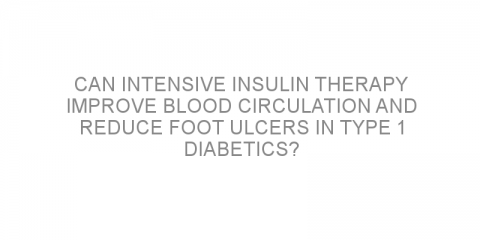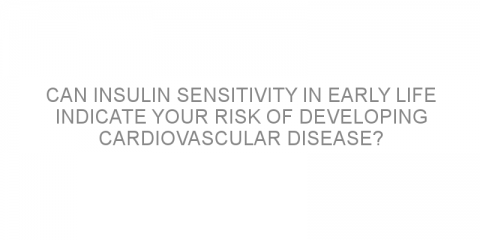In a nutshell This study investigated whether blood circulation in the skin is improved and whether the frequency of foot ulcers is decreased in patients taking intensive insulin therapy. Some background Foot ulcers are a common complication of type 1 diabetes (T1D). Chronic high blood glucose (sugar) levels can damage the small blood...
Read MoreAnti-diabetes medication(s)-Insulin Posts on Medivizor
Can vitamin D supplementation improve blood glucose levels in diabetics?
In a nutshell This study examined whether vitamin D supplementation can improve vitamin D levels, liver function and blood glucose levels in type 1 and type 2 diabetics. Some background Type 1 diabetes (T1D) is an autoimmune disease, meaning that the immune system attacks the cells of the pancreas which produce insulin and patients therefore...
Read MoreInsulin and exercise: A delicate balance
In a nutshell This study examined the effect of reduced insulin doses before and after intense exercise on post-exercise glucose (sugar), insulin, and inflammation levels in type 1 diabetes patients. Some background Exercise is important for a healthy lifestyle. It can help maintain weight, increase cardiovascular fitness and reduce daily insulin...
Read MoreCan a particular insulin help achieve less variable blood glucose levels?
In a nutshell This study compared the effects of insulin lispro protamine (Humalog), glargine (Lantus) and detemir (Levemir) on blood glucose (sugar) levels in type 1 diabetics. Some background There are many types of insulin available. They can be classified as rapid-acting, short-acting or long-acting. Rapid-acting insulin has a rapid...
Read MoreIs a bone marrow transplant effective in treating type 1 diabetes?
In a nutshell This study investigated whether a bone marrow transplant is effective in treating recently diagnosed type 1 diabetes. Some background Type 1 diabetes (T1D) is an autoimmune disease, meaning that the immune system attacks the cells of the pancreas which produce insulin. Treatments which prevent the immune attack on the pancreas...
Read MoreThe effectiveness of the insulin pump in type 1 diabetic pregnant women
In a nutshell This study examined whether pregnant women who use an insulin pump have better control of blood glucose levels and better pregnancy outcomes in comparison to those using multiple daily injections. Some background 80% of infants born to women with type 1 diabetes (T1D) have at least one complication associated with maternal diabetes....
Read MoreIs the artificial pancreas safe and effective at night?
In a nutshell This study examined the safety and effectiveness of the artificial pancreas at night in type 1 diabetic patients. Some background An artificial pancreas is a system composed of an insulin pump and a continuous glucose monitor. This system is not currently used in diabetic patients as trials are still being carried out. An...
Read MoreLow blood glucose levels while sleeping: Eating at bedtime may not reduce your risk
In a nutshell This study examined the effectiveness of bedtime snacking in reducing the risk of low blood sugar at night in type 1 diabetics. Some background Hypoglycemia (low blood sugar) can occur at night, whereby the blood glucose levels drop below 3.9 mmol/L while sleeping. In non-severe hypoglycemia, the individual awakens themselves...
Read MoreCan insulin sensitivity in early life indicate your risk of developing cardiovascular disease?
In a nutshell This study examined whether insulin sensitivity is associated with arterial stiffness in youths with type 1 diabetes. Some background Insulin sensitivity is the ability of insulin to work in the body. When insulin sensitivity is decreased (insulin resistance), hyperglycaemia (high levels of glucose in the blood) can occur. Young type...
Read MoreDoes treatment of gestational diabetes improve pregnancy outcomes?
In a nutshell This study examined whether treating mild gestational diabetes is associated with improved pregnancy outcomes. Some background Gestational diabetes is glucose (sugar) intolerance that occurs during pregnancy. This leads to hyperglycemia (high blood glucose levels). Mild gestational diabetes is defined as women who have only one...
Read MoreReducing hypoglycemia in Type 1 diabetes – is one insulin therapy more effective?
In a nutshell This study examined the effect of insulin delivery and blood glucose monitoring on the frequency of low blood glucose (hypoglycemia). Some background Hypoglycemia awareness occurs when blood glucose levels drop below 4 mmol/L, leading to symptoms that the patient recognises. This allows them to take corrective measures. Frequent...
Read MoreThe impact of an eating disorder on diabetes
In a nutshell This study examined the effect that an eating disorder has on the management and complications of diabetes. Some background The focus on an eating pattern in type 1 diabetes (T1D) patients can result in an eating disorder such as anorexia or bulimia nervosa. In addition to binge eating, patients may inject less insulin to excrete...
Read More









